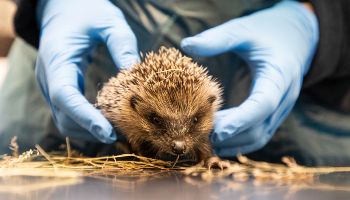As a local RSPCA rehoming centre, we aren’t equipped to deal with widlife or house them in our Animal Centre and the national RSPCA are inundated with calls that put extra pressure on their specialist teams. Read on to find out how you can be a lifeline to local wildlife and ensure you get the fastest response.
Key points from the national RSPCA:
● The National RSPCA plays an important role in inspiring everyone to create a better world for every animal. We can all do our bit for animals and by working together with the public we can reach even more animals who need help
● Animal welfare is always highest priority. More than a million calls are dealth with by the RSPCA cruelty line a year and as we approach the busy Spring and Summer time, they are asking people to help by taking small, sick and injured wildlife to the vets directly,so they can get the care they need more quickly.
● Every time a wild animal is helped by the public it frees up vital specialist rescuers to reach animals suffering heartbreaking cruelty and neglect, a job no other charity does.
● The National society urgently need more people to help, so have produced some quick and easy tools at rspca.org.uk/reportcruelty to support people to get wildlife the help it needs as quickly
as possible.

Empowering the public...
Each spring, as people start to get out and about more, we see a surge in the number of people contacting the national RSPCA line for help.
Britain has a long-held reputation as a nation of animal lovers,
demonstrated through the millions of people who contact us the helpline for advice.
Last year, the national RSPCA focussed on harnessing this compassion by successfully encouraging and advising more people to help baby birds that had fallen out of their nest.
This year, as numbers start to rise, they are extending this approach to sick and injured small wild animals so that more animals receive help more quickly. Empowering the public to take action themselves, rather than waiting for an RSPCA officer,
is the quickest way for thousands of sick and injured small wild animals to get the urgent help they need. It also enables Inspectors and Animal Rescue Officers to respond in cases of cruelty and neglect, where their specialist skills are most needed
What is changing?
When calling the hotline, the pulic are already asked on a recorded voice message when they call to transport small, sick and injured wildlife to a vet or wildlife rehabilitator and there is advice about this on www.rspca.org.uk. Please note: vets are duty bound to accept sick and injured wildlife for free. So contacting your nearest vet to transport the animal to, is most likely the best option, please try to phone in advance wherever possible.
Does this relate to all wildlife?
No, only to small, transportable sick and injured wildlife, which can be safely handled by the public without specialist equipment or. The guidance suggests any animal, such as small birds (once Avian flu restrictions have lifted), mice, bats, hedgehogs, rabbits etc, can be transported by the public. Larger wildlife, wildlife requiring specialist skills, or incidents of wildlife cruelty will still be handled by the inspectors and animal rescue officers.
What if I can't take an animal to the vet?
Every time a wild animal is helped by the public it frees up RSPCA vital specialist rescuers to reach animals suffering heartbreaking cruelty and neglect, a job no other charity does.
Unfortunately, the national society are unable to reach every animal and have to prioritise officers’ specialist skills for complex cases of cruelty and neglect. They cannot use frontline rescuers to transport small sick and injured wildlife to the vet so need the public to help with those animals and help them get the care they need quicker.
If you cannot take the animal yourself, you could speak to neighbours or friends and family who may be able to support you. Local neighbourhood groups, such as Facebook groups and Nextdoor groups or other community engagement forums can be a very useful way to access transport help in your community. So many people already help in this way and by working together we can reach more animals and get them the help they need.
USEFUL LINKS:
All injured animals pages: https://www.rspca.org.uk/adviceandwelfare/wildlife/injured
Birds:https://www.rspca.org.uk/adviceandwelfare/wildlife/birds
Baby birds: https://www.rspca.org.uk/adviceandwelfare/wildlife/birds/baby
Bats: https://www.rspca.org.uk/adviceandwelfare/wildlife/bats
Hedgehogs :https://www.rspca.org.uk/adviceandwelfare/wildlife/hedgehogs
Rabbits/hares: https://www.rspca.org.uk/adviceandwelfare/wildlife/rabbits
Rats/mice: https://www.rspca.org.uk/adviceandwelfare/wildlife/rodents
Squirrels: https://www.rspca.org.uk/adviceandwelfare/wildlife/squirrels
Report cruelty or neglect: https://www.rspca.org.uk/utilities/contactus/reportcruelty


